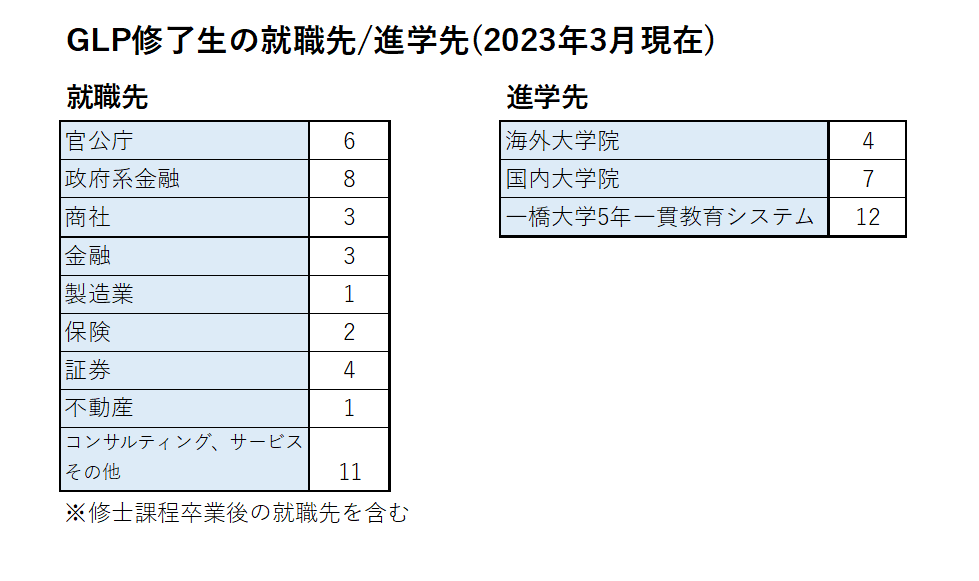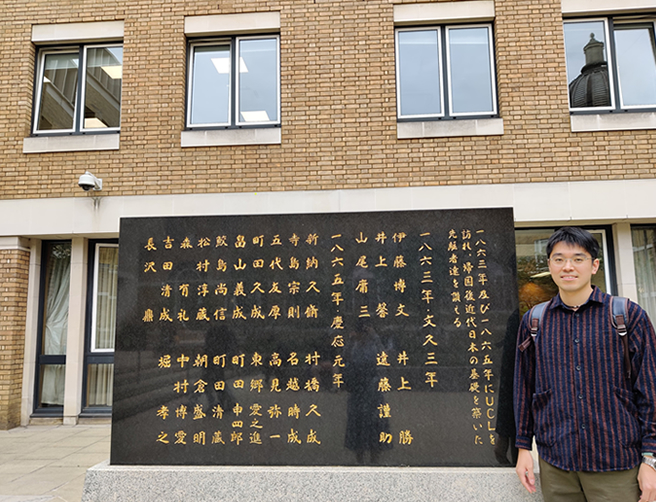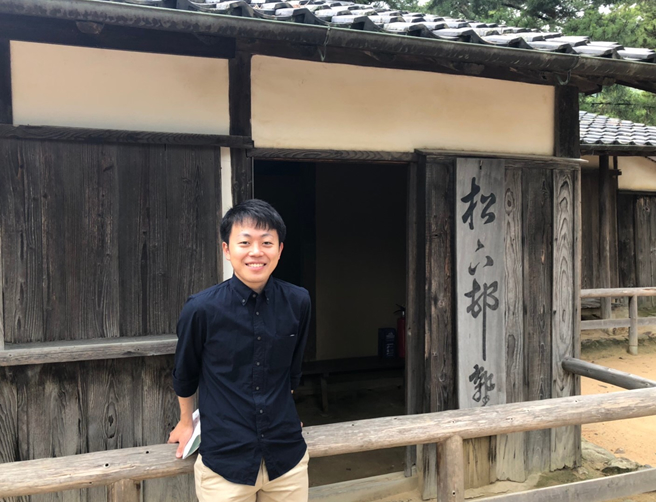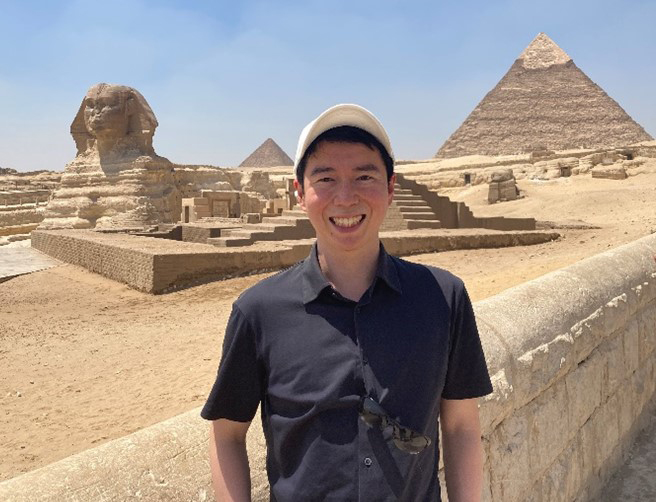
卒業生のインタビュー
Interviews with alumni

大石 凌平 Oishi Ryohei
- 経済学部GLP1期生(1st class student of Global Leaders Class)
日本銀行 (Bank of Japan)
- 経済学部GLP1期生(1st class student of Global Leaders Class)
現在の業務内容や業務経験について教えてください。
(Please let us know about the details of your work and experience.)- GLP を修了後、5 年一貫教育プログラムにて修士号を取得したのちに日本銀行に就職しました。1 年目に配属された金融市場局では、金融政策決定会合で決定された方針に基づき、実際にマーケットで取引を行うことで金融政策を実行(金融市場調節)するグループの一員として、金融市場のモニタリングや分析を行いました。中央銀行員生活の一年目で、金融政策を実行する最前線のチームの一員として情報収集にあたる責任感と達成感を得られたことは幸運なことでした。また、金融市場調節の経済理論については米欧の中央銀行エコノミストが様々なモデルを構築し学会での議論をリードしていますが、そうしたアカデミックな研究成果にも目を配りつつ、実務を通じて問題意識を醸成し分析を進めることの楽しさに気づけたことは、自身のキャリア形成に大きな影響を与えていると感じます。
その後に配属された福島支店では、いわゆる発券銀行・政府の銀行・銀行の銀行といった、日本銀行の現場での仕事を一通り経験しました。その後、福島県における毎月の経済指標を丹念に分析することに加え、主に製造業の企業に実際に足を運びインタビューするなど、現場の肌感覚も大切にしながら、生産・雇用の観点から福島県の景気判断をするための調査を行いました。特に、福島県経済の推移と課題について長期的な観点から執筆したレポートや、連続テレビ小説放映の経済効果について分析したレポートは様々なメディアにも取り上げられ、自身の分析が地域に還元されていることを嬉しく感じました。
その後配属された企画局では、金融政策運営に資する適切な企画立案のための研究・調査業務を行いました。現在は、行内の公募・選考を経て、University College London の経済学修士・博士課程で経済学の勉強・研究に励んでいます。After completing the GLP program, I obtained a master’s degree through Hitotsubashi’s five-year integrated M.A program and then joined the Bank of Japan. In my first year, I was assigned to the Financial Markets Department, where I monitored and analyzed financial markets as a member of the group responsible for executing monetary policy. Looking back, I am fortunate to be part of this front-line open market operations team and gather information in my first year as a central banker. I had a sense of achievement and responsibility in my job, and I learned how exciting and interesting it is to generate research questions through practical experience and to learn from academic research on the economic theories of open market operations led by central bank economists in the United States and Europe. These experiences have had a significant influence on my career development.
- GLP を修了後、5 年一貫教育プログラムにて修士号を取得したのちに日本銀行に就職しました。1 年目に配属された金融市場局では、金融政策決定会合で決定された方針に基づき、実際にマーケットで取引を行うことで金融政策を実行(金融市場調節)するグループの一員として、金融市場のモニタリングや分析を行いました。中央銀行員生活の一年目で、金融政策を実行する最前線のチームの一員として情報収集にあたる責任感と達成感を得られたことは幸運なことでした。また、金融市場調節の経済理論については米欧の中央銀行エコノミストが様々なモデルを構築し学会での議論をリードしていますが、そうしたアカデミックな研究成果にも目を配りつつ、実務を通じて問題意識を醸成し分析を進めることの楽しさに気づけたことは、自身のキャリア形成に大きな影響を与えていると感じます。
Read More
After my time in the Financial Markets Department, I was transferred to the Fukushima branch, where I gained experience in operational work such as issuing banknotes and handling transactions as the “government’s bank” and “bank’s bank.” Additionally, I analyzed Fukushima Prefecture’s economic conditions from the perspective of production and labor markets. As a regional economist, my job involved not only carefully analyzing monthly data but also conducting interviews with manufacturing companies to gain a better understanding of the real economy. I also wrote papers on the long-term economic growth and challenges of Fukushima’s economy, as well as the economic effects of a television drama series on tourism. My papers were covered by several media outlets, and I was glad to see that my analysis contributed to the local community.
Following my time at the Fukushima branch, I was assigned to the Monetary Affairs Department, where I conducted research to provide a solid foundation for planning and advising on the conduct of monetary policy. Currently, I am studying graduate economics at the University College London through an internal program sponsored by the Bank of Japan.
GLPでの経験がどのように役に立っていますか?
(How the experience of GLP is helpful to your current job?)- GLP で学んだことは、日々の仕事を進めていくための経済学の知識や英語力というハードスキルの面で、直接的に役立っています。加えて、中央銀行員として、更には社会の一員として生きていく上での人間性の核となる部分を形成するうえでも、貴重な経験だったと思います。
- まず、GLP での活動を通じて、純粋な語学力としての英語力やプレゼンテーション力、また経済学を英語で学ぶ力が鍛えられました。GLP のゼミでは、外国出身の教員の方に発音からプレゼンテーションの方法まで厳しく指導していただいたこと、中国への海外短期研修では、事前に自分で決めたテーマについて半年間かけて少人数ゼミで議論し理解を深めた上で、現地の中国人学生と英語で議論したこと、約 1 年間のアメリカ留学では、当地の教員や学生と共同研究を行いセミナーで発表したことや(手違いもあって留学生用ではなく)米国人学生用の寮に入寮することになり米国式の学生生活を本格的に経験できたことなど、GLP に参加しなければ得られなかった経験を通じて、入学時点からは想像できないほど、英語力が高まりました。また、留学先での授業に加え、経済学部専門科目の単位の 6 割以上を英語による授業で取得したことで、経済学を英語で学ぶ力もついたと思います。入学当初は、ペーパーテストとしての大学受験に合格するための英語力しかありませんでしたが、卒業時には海外の人とも議論できるリスニング力やスピーキング力、経済学の専門論文を英語で読み解くリーディング力、研究成果を英語でまとめるライティング力が身につきました。
日本銀行での日々の業務では、海外の著名な経済学者や海外中央銀行高官の発言を分析したり、学術論文を読んで調査業務に活用するなど、英語で情報収集する機会も多く、大学時代にしっかりと英語で経済学を学ぶ経験を積んでおいてよかったと感じています。また企画局での研究内容は、英語の論文にまとめて対外公表をしたのち、複数の国際学会において発表を行う機会もありました。このほかにも、様々な場面で自身の分析結果を行内の関係者にプレゼンテーションをする機会が多く、GLP でプレゼンテーションの経験を多く積んだことが役立っていると感じます。
最後に、長期海外留学や海外研修における短期間での日英両言語のレポート作成、英語での専門科目の単位取得など、一見無理難題にも感じられる GLP での試練は、言語化することは難しいですが、一人の人間としての胆力を養う素晴らしいチャンスだと思います。特に、感性豊かな10代後半から20代前半に長期海外留学を経験することは、当然カルチャーショックなどで辛いこともありますが、それも含めて、人間性の幅を広げる最高のチャンスの一つになるのではないかなと思います。一橋大学に入学した皆さんは、優れた学習能力や意欲をお持ちだと思います。そこから先は、テストの成績等の数字では表現できない、人間としての豊かさや経験、懐の深さなど総合力での勝負だと思います。ぜひ、GLP に挑戦して、充実した学生生活を送られることを期待しています。The skills and knowledge I gained from the GLP program, including the improvement of my economic knowledge and English proficiency, have been directly beneficial to my daily work. Additionally, the program provided a valuable opportunity to develop my personality as a member of society and as a central banker.
Read More
- Through my participation in the GLP program, I was able to hone my English proficiency in various areas, including language skills, presentation skills, and the ability to learn economics in English. Foreign instructors in GLP seminar taught us pronunciation, effective presentation techniques, and other language-related skills. During a short-term research program, including a field study in China, we chose our research topic and deepened our understating in small group seminars for six months in Japan, followed by a visit to China to discuss our research themes with international institutions, local firms, and university students in English. As part of a year-long study abroad program in the United States, I conducted joint research with professors and students and presented research results in a seminar. Moreover, I accidentally ended up living in a dormitory for American students, which gave me the opportunity to fully immerse myself in American student life. These experiences greatly improved my English proficiency beyond my expectations when I was first admitted to Hitotsubashi University. I also completed more than 60% of my economics courses in English, which has equipped me with the ability to conduct economic research using English. When I first passed the entrance exam, I only had enough English proficiency to pass the exam as a written test. However, by the time I graduated, I had developed listening and speaking skills to communicate with foreign people, reading skills to understand academic papers in economics, and writing skills to produce research papers in English.
- My work at the Bank of Japan requires collecting and analyzing information in English, including studying statements by prominent foreign economists and central bank officials and reading academic papers to apply their findings to my research. In these situations, I find it beneficial to have gained experience studying economics in English during my university education. I also wrote a paper about my research findings in the Monetary Affairs Department in English and presented it at several international conferences. Moreover, I regularly present my work to my colleagues in a variety of settings. The presentation skills I developed during GLP have proven invaluable in these situations, allowing me to communicate my findings clearly and effectively.
The challenges presented by the GLP program, such as studying abroad, completing reports in both Japanese and English in a short time, and earning credits in English, may seem daunting at first. However, I believe that these challenges will provide an opportunity for you to develop your personality and grow as an individual. In particular, studying abroad for an extended period during your late teens and early twenties will be a valuable experience, despite the culture shock and difficulties you may face. As a student admitted to Hitotsubashi University, you undoubtedly possess excellent learning abilities and motivation. However, beyond academic proficiency, enriching your overall personality and character through diverse experiences, which cannot be expressed by test scores, is crucial for success in life. I encourage all Hitotsubashi University students to consider joining the Global Leaders Program and to make the most of their student life.

萩尾 亘 Hagio Wataru
- 経済学部GLP1期生(1st class student of Global Leaders Class)
日本銀行
(Bank of Japan)
- 経済学部GLP1期生(1st class student of Global Leaders Class)
現在の業務内容や業務経験について教えてください。
(Please let us know about the details of your work and experience.)- 私が配属された調査統計局では、四半期に一度、短観という統計調査を実施しています。全国短観は、全国の企業動向を的確に把握し、金融政策の適切な運営に資することを目的としています。足もとの経済の現状を分析する上で、企業の景況感を示す業況判断や設備投資計画などは貴重な情報になります。50年以上の長い歴史のある調査で責任は重大です。現在は、大阪支店において関西の経済情勢の分析を行っています。景気分析においては、統計から得られるマクロ情報と個別企業に対するヒアリングから得られるミクロ情報を組み合わせて判断を行っています。足もとの情報については、企業の方に生のお話をお伺いする方が経済の実態をすばやくつかめます。また、先ほどの全国短観に関連し、大阪支店では関西2府4県の企業を対象とした近畿地区の短観を公表しており、こちらの統計作成にも従事しています。経済・統計の専門性を活かしつつ、経済・物価情勢の現状把握の一端を担えることに大きなやりがいを感じています。
- I was assigned to the Research and Statistics Department, where BoJ staff work together to conduct a survey called the “Tankan” on a quarterly basis. The survey aims to provide an accurate picture of the business trends of enterprises in Japan, thereby contributing to the appropriate implementation of monetary policy. Survey items such as “business conditions,” indicating enterprises’ confidence, and “fixed investment forecast” are valuable in analyzing economic activity. Since the Tankan has a long history of more than fifty years, the survey carries a huge responsibility. I am now analyzing the current situation of economic activity in the Kansai region at the Osaka branch. In analyzing the economy, the Bank combines macro-sources, such as official statistics, with micro-sources, such as anecdotal information from firms, to make balanced assessments. Regarding very recent information, anecdotal information from firms better provides the actual state of the economy. Also, relating to the “Tankan,” the Osaka branch releases the “Local Branch Tankan” in the Kansai region, and I am engaged in the work. I am filled with a strong sense of purpose in my work because I can play a part in grasping economic activity and prices while utilizing specialization in economics and statistics.
GLPでの経験がどのように役に立っていますか?
(How the experience of GLP is helpful to your current job?)- 経済学部GLPでは、英語で経済学を学ぶ機会、学部独自の少人数クラスで総合的な学術英語スキルを鍛える機会、ベルギーへの留学で経済学を学ぶ機会などさまざまな貴重な経験をさせていただきました。入行1年目に金融市場局で海外機関投資家との議論に同席した際には、実践的なリスニング力が役に立ちました。また3年目の調査統計局で海外中央銀行の方に経済統計について英語でプレゼンする機会をいただいた際には、GLPゼミでのスピーキング特訓のおかげもあり、自信を持って発表することができました。加えて経済調査を行うにあたり、海外の文献を読みながら「今必要とされている分析は何か」を自分で考える上で、専門ゼミナールや高度な大学院科目で鍛えていただいた経済学の専門性や英語の読解力が活きていると感じます。行内の公募・選考を経て、海外大学院の経済学修士課程で経済学の更なる研鑽に努めたいと考えています。
- In the GLP curriculum, I was given many precious opportunities to take courses in economics taught in English, to take small-group English language classes covering listening, speaking, writing, and presentation, and to study economics in Belgium as a part of longer-term studies abroad program. When I attended discussions with foreign institutional investors at the Financial Markets Department in my first year at the bank, my practical listening skills were helpful. Also, in my third year at the Research and Statistics Department, thanks to intensive training on speaking skills in the GLP seminar, I could confidently deliver an English presentation on Economic Statistics to foreign central bank staff. Additionally, in conducting economic research, specialization in economics and English reading skills, acquired in specialized seminars and advanced graduate-level economics courses, are vital assets in contemplating “What matters under the current situation of economic activity?” while reading foreign articles. After the internal application and selection process, I would like to further my studies in MSc Economics at a graduate school abroad.

桝田 敏弘 Masuda Toshihiro
- 経済学部GLP2期生(2nd class student of Global Leaders Class)
株式会社日本貿易保険(NEXI)
(Nippon Export and Investment Insurance)
- 経済学部GLP2期生(2nd class student of Global Leaders Class)
現在の業務内容や業務経験について教えてください。
(Please let us know about the details of your work and experience.)- 私が勤務している日本貿易保険(NEXI)は、国内で唯一、貿易保険事業を担っている、日本政府100%出資の政府系金融機関です。貿易保険は、日本企業が行う輸出入や海外投融資などの海外取引に伴うリスクをカバーする公的な保険制度です。具体的には、非常リスク(≒国のリスク)と、信用リスク(≒取引先のリスク)の発生に伴う輸出不能、代金回収不能、投資先の事業休止等により、日本企業側に生じる損失をカバーすることで、日本企業の海外ビジネスをサポートしています。
- 現在私は、融資保険を扱う部署で、日本企業が参画する海外プロジェクト・ファイナンス案件や、外国政府、国際機関向けファイナンス案件の組成・新規引受を担当しています。また昨夏のTICAD8の際には、アフリカの国際機関との協力覚書締結や、国際機関との共同ウェビナー開催も担当しました。
- Nippon Export and Investment Insurance (NEXI) is the export credit agency of Japan responsible for trade insurance, wholly owned by the Japanese government. Trade insurance is a public insurance system which covers risks associated with export and import, global investment and financing, and other international transactions carried out by Japanese companies. To support global businesses of the Japanese companies, NEXI provides coverage for losses due to political risk (country risk) events and commercial risk (credit risk of buyers) events, such as inability to ship goods, failure to collect receivables, debt default, and business suspension of the investee.
Now I am working in Structured and Trade Finance Insurance Department of NEXI where I am mainly responsible for structuring and underwriting insurance for overseas project finance that Japanese companies engage in, as well as for financing to sovereign projects and multilateral institutions. In TICAD8 held last summer, my team worked to conclude a memorandum of understandings with multilateral institutions in Africa and also took on the task to hold a joint webinar with the African multilateral institutions.
GLPでの経験がどのように役に立っていますか?
(How the experience of GLP is helpful to your current job?)- 経済学部二年次に参加したGLP短期海外調査(中国)が、海外と関わる仕事に興味を持つきっかけになりました。元国際協力機構(JICA)中国事務所長の中川先生のゼミで、中国の経済・社会について理解を深めながら、実際に中国へ渡航し、農村部の視察や、大使館・JICAや日本企業の現地法人等への訪問、現地大学生とのディスカッションを行うというプログラム(当時)です。このプログラムに参加し、中川先生のご指導を受けたことが、現在の自分のキャリア選択に繋がっています。
- During my sophomore year, I participated in the GLP International Field Study Program (China) which made me open my eyes to a career related to global business. In the program, we did desk research on Chinese economy and society at a seminar led by Nakagawa Sensei, former Chief Representative of JICA China Office. We then flew to China for specially coordinated events, including field trip to rural villages, visits to the Embassy of Japan, JICA, and local offices of Japanese companies, and discussions with the local college students. My career interests were developed through this program and the insights I gained from Nakagawa Sensei.

